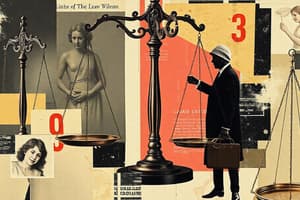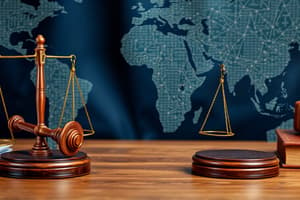Podcast
Questions and Answers
Which of the following statements is a characteristic of legal centralism?
Which of the following statements is a characteristic of legal centralism?
- All legal systems belong to the Western Legal Tradition
- Legal systems are determined solely by cultural practices
- A single legal system can correspond only to a single geographical area (correct)
- Every legal system is based upon a specific natural law conception
What lesson does the tulip bubble illustrate about markets?
What lesson does the tulip bubble illustrate about markets?
- Market trends are always predictable
- Any market must have rules designed outside of it (correct)
- The state should not meddle in market matters
- Goods automatically find a price in the market
What became the connection between land and sea orders in the new Jus Publicum Europaeum?
What became the connection between land and sea orders in the new Jus Publicum Europaeum?
- The French state
- The island of England
- The Empire (correct)
- The Mediterranean Sea
What do comparative and global approaches commonly share?
What do comparative and global approaches commonly share?
What does the 'gold standard' refer to?
What does the 'gold standard' refer to?
How is Chinese political and legal philosophy characterized?
How is Chinese political and legal philosophy characterized?
The normative conceptualization of globalization is defined as what?
The normative conceptualization of globalization is defined as what?
Who authored 'The Geographical Pivot of History'?
Who authored 'The Geographical Pivot of History'?
What is the main function of the World Trade Organisation (WTO)?
What is the main function of the World Trade Organisation (WTO)?
Which of the following constitutes the three pillars of Bretton Woods institutionalized multilateralism?
Which of the following constitutes the three pillars of Bretton Woods institutionalized multilateralism?
When was the Modern State conventionally considered to be born?
When was the Modern State conventionally considered to be born?
What does the 'Law and Development' earliest background represent?
What does the 'Law and Development' earliest background represent?
How is natural law typically described in a broad sense?
How is natural law typically described in a broad sense?
What characterizes the second generation of the 'Law and Development' approach in the early 1980s?
What characterizes the second generation of the 'Law and Development' approach in the early 1980s?
What aspect is highlighted as a characteristic of the American version of legal realism?
What aspect is highlighted as a characteristic of the American version of legal realism?
What is the major argument linking law and economics?
What is the major argument linking law and economics?
According to legal universalism, human rights are characterized by which of the following?
According to legal universalism, human rights are characterized by which of the following?
What type of law structure characterized Middle Ages Western European law?
What type of law structure characterized Middle Ages Western European law?
The official absence of the USA created problems for which international organization?
The official absence of the USA created problems for which international organization?
What was the consequence of the Monroe Doctrine declared in 1823?
What was the consequence of the Monroe Doctrine declared in 1823?
The influential figures behind the Bretton Woods system include?
The influential figures behind the Bretton Woods system include?
Flashcards
Legal Centralism
Legal Centralism
A legal ideology of modernity that believes in a single, overarching legal system for all societies, often associated with Western legal traditions.
Gold Standard
Gold Standard
A monetary system where the value of a currency is directly tied to a fixed amount of gold. It was widely used in the 19th and early 20th centuries.
Tulip Bubble
Tulip Bubble
A historical event where the prices of tulip bulbs in the Netherlands inflated massively before collapsing. It illustrates the dangers of speculative bubbles and market instability.
Renzhi (Governance of Men)
Renzhi (Governance of Men)
Signup and view all the flashcards
WTO (World Trade Organization)
WTO (World Trade Organization)
Signup and view all the flashcards
Normative Conceptualization of Globalization
Normative Conceptualization of Globalization
Signup and view all the flashcards
The Geographical Pivot of History
The Geographical Pivot of History
Signup and view all the flashcards
Jus Publicum Europaeum
Jus Publicum Europaeum
Signup and view all the flashcards
What is the World Trade Organisation (WTO) and what is its primary function?
What is the World Trade Organisation (WTO) and what is its primary function?
Signup and view all the flashcards
How is the constitutional chain of legitimacy established?
How is the constitutional chain of legitimacy established?
Signup and view all the flashcards
What are the three pillars of Bretton Woods institutionalized multilateralism?
What are the three pillars of Bretton Woods institutionalized multilateralism?
Signup and view all the flashcards
When and how did comparative law emerge?
When and how did comparative law emerge?
Signup and view all the flashcards
When was the Modern State conventionally born?
When was the Modern State conventionally born?
Signup and view all the flashcards
What is the core argument of Professor Coleman's article "The Hobbesian Basis of American Constitutionalism"?
What is the core argument of Professor Coleman's article "The Hobbesian Basis of American Constitutionalism"?
Signup and view all the flashcards
What characterized the second generation of the "Law and Development" approach?
What characterized the second generation of the "Law and Development" approach?
Signup and view all the flashcards
What is one distinctive feature of American legal realism?
What is one distinctive feature of American legal realism?
Signup and view all the flashcards
How do the authors of the article "The Economic Consequences of Legal Origins" define legal origin?
How do the authors of the article "The Economic Consequences of Legal Origins" define legal origin?
Signup and view all the flashcards
What was the earliest background of the "Law and Development" approach?
What was the earliest background of the "Law and Development" approach?
Signup and view all the flashcards
How was Western European law structured in the Middle Ages?
How was Western European law structured in the Middle Ages?
Signup and view all the flashcards
What was the problem of the relation between the League of Nations and the 'Western Hemisphere'?
What was the problem of the relation between the League of Nations and the 'Western Hemisphere'?
Signup and view all the flashcards
What did the Monroe Doctrine declare in 1823?
What did the Monroe Doctrine declare in 1823?
Signup and view all the flashcards
What distinguishes natural law theories?
What distinguishes natural law theories?
Signup and view all the flashcards
Study Notes
Legal Centralism
- Key characteristic is not all legal systems belonging to the Western Legal Tradition, nor based on a single natural law conception, nor limited to one geographical area.
Tulip Bubble Lesson
- Markets require external rules (not internal).
Jus Publicum Europaeum
- Connecting link is not the French state, but potentially the Empire.
Comparative & Global Approaches
- Shared characteristic: complex approach to study law, economics, and politics, appearing universalist.
Gold Standard
- A monetary system where the unit is a fixed amount of gold or maintains that value.
Chinese Political & Legal Philosophy
- Focuses on governance/ruling of people ("renzhi").
Normative Conceptualization of Globalization
- Primarily concerned with the rules governing state relationships.
Geographical Pivot of History
- Authored by H. J. Mackinder.
WTO System
- Function: to ensure smooth and predictable trade flow.
Constitutional Chain of Legitimacy
- Originates from the people and is channeled through constitutions.
Bretton Woods Pillars
- IMF, WB, GATT
Comparative Law's Emergence
- Developed in the 19th and 20th centuries, not the 13th century.
Modern State's Birth
- Conventionally associated with the Peace of Westphalia.
Hobbesian Basis of American Constitutionalism
- Focuses on Hobbes, and Locke, particularly Madison (and their Hobbesian aspects).
Second Generation of Law & Development
- Characterized by diverse legal reform projects, moving from state focus to market-oriented policies.
American Legal Realism
- Recognizes the difference between law in action and law in the books (not exclusively positive law).
Economic Consequences of Legal Origins
- Authors adopted a broad conception of legal origin, linking it to social control of economic life.
Law & Development's Origins
- Rooted in Western economies promoting legal reforms in developing countries.
Medieval European Law
- Divided into local ("ius proprium") and transnational ("ius commune") law.
League of Nations & Western Hemisphere
- Problem stems, in part, from the US's official absence and effective presence.
Monroe Doctrine
- Removed the Western Hemisphere from further European land-appropriations.
Natural Law Theories
- Theoretical constructions of normative rules perceived as derived from non-human sources (not simply religious or moral rules).
Bretton Woods Inspirers
- John Maynard Keynes and Henri Dexter White
Legal Universalism
- Human rights have universal application and are not confined to national borders.
Cultural Nature of Laws & Globalization
- Stresses "glocalization" (global and local) alongside globalization.
Scientification of Comparative Law's Culmination
- Likely the great congress of Paris in 1900, possibly other related congresses.
Linking Law & Economics
- Main argument focuses on efficiency dependent on (and likely improved by) democratic institutions.
Authoritarian Regimes & Rule of Law
- Authoritarian regimes rely on legal frameworks, and use law for self-reform.
Globalization's Main Actors
- Market and state.
Pluralist Theories
- Acknowledge and value legal diversity globally, rejecting harmonization.
Studying That Suits You
Use AI to generate personalized quizzes and flashcards to suit your learning preferences.




